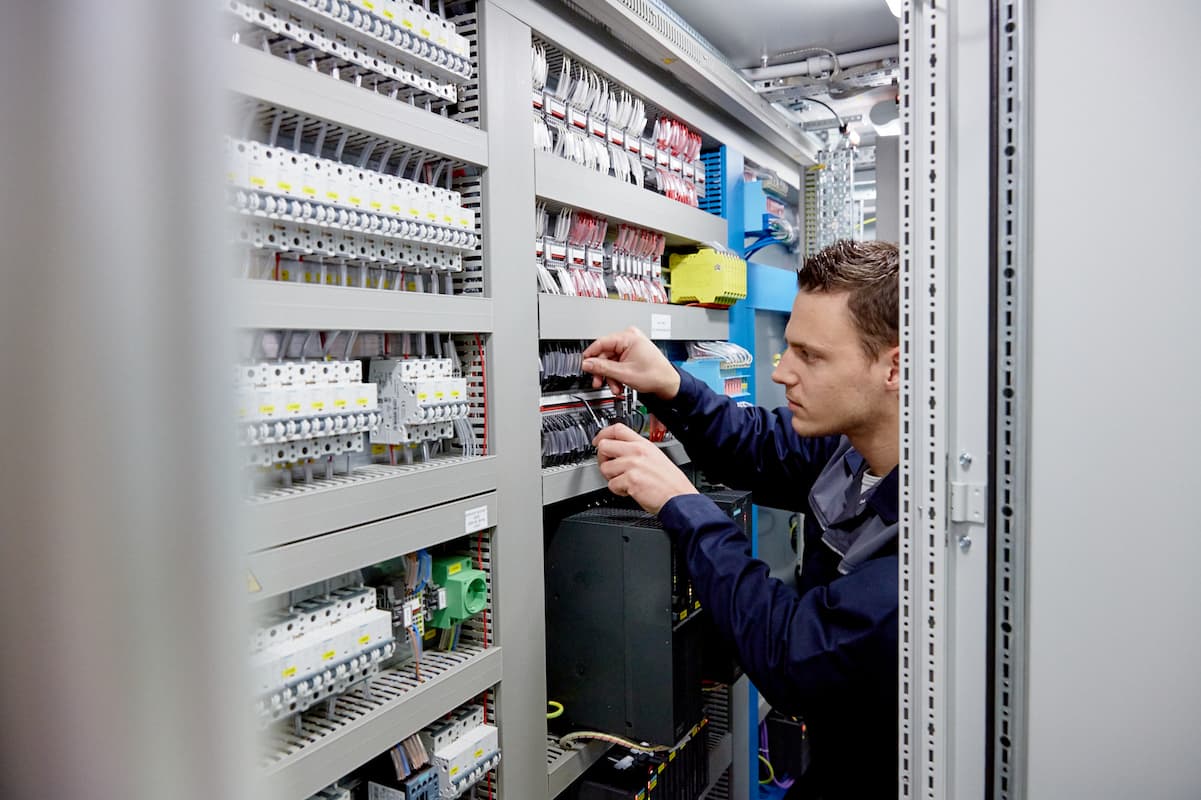An industrial electrician is an electrical whiz with a knack for navigating complex electrical circuits used in major industries. They are commonly responsible for installing and setting up electrical systems and equipment, such as in motors, generators, transformers, and control systems. They read and interpret technical diagrams and blueprints to determine the best placement and configuration of electrical equipment and wiring.
An industrial electrician must also perform routine maintenance on electrical equipment to ensure it operates efficiently and safely. This includes cleaning and replacing parts, repairing faulty wiring, and testing electrical systems to identify and address potential problems before they become serious.
They need to apply their knowledge of electrical systems to diagnose and troubleshoot problems with equipment and systems. They may use testing equipment such as voltmeters, oscilloscopes, and other tools to determine the cause of electrical malfunctions. When electrical equipment and systems fail, an industrial electrician restores them to working order. This may involve replacing faulty components, rewiring systems, or upgrading equipment to improve performance.
An industrial electrician maintains accurate records of electrical installations, repairs, and maintenance. They document their work in logs and reports and ensure that all work is performed in accordance with company and industry standards.
An industrial electrician must follow strict safety protocols to ensure that electrical equipment and systems are installed, maintained, and repaired safely. This includes adhering to codes and regulations, wearing protective gear, and taking steps to prevent electrical shocks, fires, and other hazards.
To excel in this position, industrial electricians must be outstanding problem-solvers, with exceptional communication skills. Industrial electricians often work alongside electrical engineers and contractors, as well as technicians and team members. Furthermore, this role is for people who can focus well and love working with their hands to operate a diverse set of tools and equipment.
Industrial electricians are needed in a range of sectors. They can specialize in industries like construction, where they are commonly referred to as construction electricians and install electricity and electrical equipment in infrastructures. They can also find opportunities in industries such as manufacturing, mining, ship and boat building, maintenance, aerospace, energy, and automotive. The demand for industrial electricians will remain as electricity continues to dominate power supply, only increasing for instance in the automotive sector given the rise of electrical vehicles.
Apply now for a job as Industrial electrician!
Industrial Engineer - Fertigungsvorbereiter (w/m/d)
Location: Cuxhaven
Branche: Renewable Energy
Expertise: Production & Manufacturing
Experience: 2 years
Analyse und Optimierung von Fertigungsprozessen: Sie analysieren bestehende Arbeitssysteme und gestalten diese effizient und zukunftsorientiert weiter. Gestaltung ergonomischer Arbeitssysteme: Sie berücksichtigen technische, ergonomische und wirtschaftliche Aspekte bei der Planung von Fertigungsabläufen. Sicherstellung von Qualitätsstandards: Sie gewährleisten die Einhaltung definierter Qualitätsvorgaben im gesamten Produktionsprozess. Umsetzung von Effizienzsteigerungen: Sie identifizieren Verbesserungspotenziale und setzen gezielte Maßnahmen zur Steigerung der Produktivität um. Kontinuierliche Prozessverbesserung: Sie treiben systematisch die Weiterentwicklung von Fertigungsprozessen im Produktionsumfeld voran. Schnittstellenübergreifende Zusammenarbeit: Sie arbeiten eng mit angrenzenden Abteilungen zusammen, um reibungslose Abläufe sicherzustellen.
Lean Manager / Industrial Engineer (m/w/d)
Location: Bielefeld
Branche: Automotive
Expertise: Planning & Testing
Experience: 1 years
Sie sind für ein permanentes und nachhaltiges Optimieren von Prozessen und Materialströmen in unserem operativen Bereich verantwortlich Sie verantworten die Implementierung einer Lean Kultur in der Fertigung Sie stellen eine störungsfreie Produktion sicher Sie führen Workshops und Trainings zur Umsetzung von Verbesserungsmaßnahmen durch
Electrician - Artificial Lift System
Location: Brisbane
Branche: Conventional Energy
Expertise: Planning & Testing
Experience: 3 years
As an ALS Electrician, you will play a pivotal role in the installation, commissioning, and maintenance of automation systems for artificial lift equipment, specifically Rotaflex and Beam Pumping Units. Installation & Commissioning: Lead the setup and integration of automation systems for Rotaflex and Beam Pumping Units, ensuring alignment with project specifications and safety standards. System Troubleshooting: Diagnose and resolve electrical and automation issues, utilizing schematics, PLC logic, and Modbus communication protocols. Maintenance & Repairs: Perform routine inspections, preventive maintenance, and emergency repairs to maintain system integrity and minimize downtime. Documentation & Compliance: Prepare and maintain detailed records, including Hazardous Area Certification Dossiers and Certificates of Conformance, ensuring adherence to Australian Standards (AS3000). Inventory Management: Plan and manage electrical spare parts, ensuring availability and readiness for operations.
GIS Specialist (O&G)
Location: Doha
Branche: Conventional Energy
Expertise: Planning & Testing
Experience: 5 years
Plan, Organize and manage all activities required for timely acquisition of geospatial information and update of Industrial Cities GIS (which covers 90% of Company Onshore) in order to ensure data currency.Provide Technical support for Development and Management of Industrial Cities all Land Management GIS activities and Application.Initiate and manage Spatial data gathering and GIS implementation projects throughout the complete project life cycle.Provide GIS services including Maps, charts, spatial information, Reports and geospatial analysis across the industrial cities.Gather, select, extract, integrate, calculate, publish, interpret, and provide GIS data and information used in maps, charts, reports and documents based on departmental criteria such as aerial/satellite imageries, coordinate systems, georeferencing, contours, service levels, elevations, property lines, right of ways, roadways, land allocation records, survey/site visits etc.Create, edit, update and prepare productive layers (feature classes) of GIS data, maps, charts, web maps, GIS portal and drawings using manual and automated methods.Develop, design and implement approved procedures and methods for performing applications and GIS business and portal solutions.Provide user support, trainings, familiarization, announcements, presentations services to GIS users to ensure effective utilization of GIS technology to improve Company business.May write, test, and debug complex programs and applications using various software tools (e.g. VB, ARC/IMS, SQL, PYTHON).Coordinate and liaise with Company Geospatial Information Systems Section to ensure the flow of GIS data services.Perform activities and functions of related lower-level personnel as assigned or required. Coordinate, supervise, QA/QC the work of supporting GIS Technicians and related tasks and duties as assigned or required.Review, Sign and endorse excavation permit requests from contractors as needed.Create, re-create, track and publish (To Qatar Central GIS - CGIS) PIN (Parcel Identification Number) according to Industrial Cities Master Plan requirements and/or land allocation or survey records.
Sr. Mechanical Engineer
Location: Doha
Branche: Conventional Energy
Expertise: Planning & Testing
Experience: 5 years
Identify, develop, evaluate and optimize infrastructure project mechanical aspects / concepts including reviewing Project Development Proposal (PDP), developing statements of requirement (SORs) and preparation of Project Initiation Note (PIN) for new capital projects to be executed under Technical Directorate.Also prepare and issue Work Change Request (WCR) if required in close coordination with Engineering / asset holder during the execution of the project.Review and approve End-Users/Tenants/Investors technical submissions for off-plot, onplot and port expansion developments, related to Mechanical items of work in line with Industrial Cities’ Master Plan and applicable Guidelines, Standards and Regulations.Review and endorse Scope of Work (SOW) and technical submittals for all Engineering projects executed by Technical Directorate to ensure Industrial Cities requirements with regard to interfaces, tie-in connections, materials specifications, pre-commissioning and commissioning etc. are complied.Also, Interact with Project Department regarding implementation of Mechanical system associated with various projects' to identify synergies between projects and for optimization.Review and approve Tenants/Investors Building Permit Technical submittals including MS & JSA, related to Mechanical items of work to be in line with Industrial Cities' Master Plan and applicable Guidelines, Standards and Regulations.Actively participate in Mechanical completion walkthrough for projects to ensure facility is constructed as per the Scope of work and approved drawings/documents and in Operational handover / Final handover walkthrough.Carry out site inspections to ensure Mechanical parts of the facility built in compliance with the building permit approval.Also, site visits to resolve conflicting issues between Tenant and Operation and Maintenance Department during utility tie-in connections and crossings.Coordinate/interface with Departments, Consultants, Contractors, End Users to finalize the technical requirements/interface with other Projects, pre-commissioning, commissioning activities for the Project.Coordinates the works and schedule of various ECS and EPIC contractors working for and End Users to resolve interface and conflict issues.Ensure that the Cities Regulations and Guidelines are adhered by major industries and contractors working in the Industrial Cities Standards by participating in design reviews, HAZOPstudies, 3D Model reviews etc. technical requirements and space optimizations stated in IndustrialAs applicable, review and approve the Consolidated Permit to Work (e-CPW) and building permit applications for all Mechanical related activities executed by contractors / End-Users / Tenants / Investors in common areas and ensure compliance with requirement.Technically contribute in the review of existing procedures, regulations and guidelines related to the Development, Planning and Engineering and recommend amendments. Contribute in the development and implement new “Technical Guidelines” for use by End-Users/Tenants and QP Projects.
Common industrial electrician responsibilities
- Inspecting electrical components in equipment, machines, systems and building to identify any issues;
- Repairing faulty equipment and damaged electrical components;
- Developing and implementing preventative procedures to manage electrical systems and guarantee functionality;
- Planning and scheduling repairs as needed;
- Conducting periodic quality checks on electrical equipment and systems to ensure everything is up to standard;
- Performing general routine maintenance tasks like repairing electrical circuitry in a building;
- Helping develop and implement the budget for the electrical maintenance activities;
- Maintaining the inventory records for electrical equipment and supplies;
- Collaborating with electrical engineers, contractors, or other technical specialists to resolve problems;
- Delivering electrical service outputs in compliance with relevant requirements, codes, and certifications, and in line with customer needs and demands;
- Participating in trainings as needed;
- Assuring the safety and security of oneself and team members.
Qualifications for industrial electricians
Industrial electricians should have at least a high school diploma and a technical or trade certification as an electrician. A Bachelor’s degree in Electrical Engineering or similar field is advantageous, particularly if one’s desire is to pursue a career as an electrical engineer.
Additional supporting skills and experience include:
- 2+ years’ experience in a similar electrician role;
- Strong foundation in mathematics, science, and technical subjects;
- In-depth knowledge of electricity and electrical systems;
- Solid understanding of electrical maintenance procedures and techniques;
- Able to read technical diagrams and blueprints;
- Possess good hand-eye coordination;
- Using problem-solving abilities effectively;
- Having excellent written and verbal communication skills;
- Being well-organized and having the ability to prioritize tasks.




